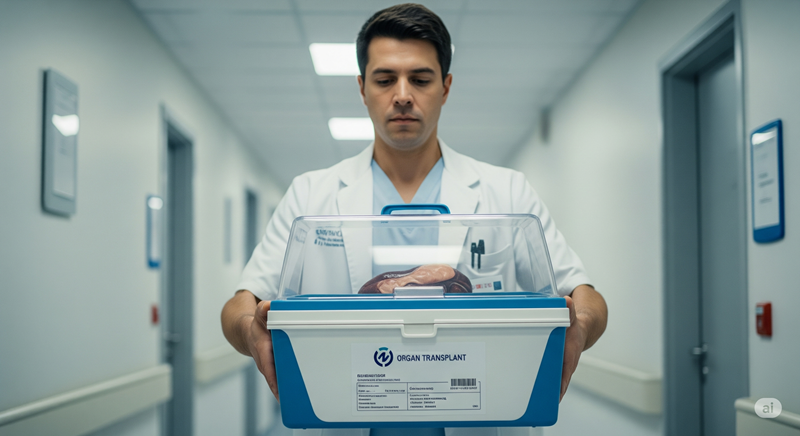Organ Transplantation: A New Horizon for Life
 Organ transplantation stands as one of the most remarkable achievements in modern medicine, offering a new lease on life to individuals suffering from end-stage organ failure. From its nascent beginnings to the sophisticated procedures of today, the field has undergone a profound transformation, driven by relentless innovation and a commitment to saving lives.
Organ transplantation stands as one of the most remarkable achievements in modern medicine, offering a new lease on life to individuals suffering from end-stage organ failure. From its nascent beginnings to the sophisticated procedures of today, the field has undergone a profound transformation, driven by relentless innovation and a commitment to saving lives.
The Dawn of a New Era: Advancements in Organ Transplant
The journey of organ transplantation has been marked by continuous breakthroughs, each pushing the boundaries of what's possible:
- Revolutionary Preservation Techniques: Historically, the limited viability of donor organs outside the body posed a significant challenge. However, advancements like machine perfusion systems (e.g., OrganOx metra®) have revolutionized organ preservation. These devices mimic the body's natural environment, providing oxygenated blood, nutrients, and medications to organs at normal body temperature. This extends the critical window for transplantation, allowing for more thorough assessment of organ function and increasing the number of viable organs.
- Targeted Immunosuppression and Reduced Rejection: Early transplants faced high rates of organ rejection due to the recipient's immune system attacking the foreign organ. The development of advanced immunosuppressive drugs and targeted immunotherapies (like monoclonal antibodies) has been a game-changer. These medications effectively manage the immune response, significantly reducing rejection rates and improving long-term outcomes for transplant recipients. Ongoing research into gene-editing technologies, such as CRISPR-Cas9, aims to further enhance organ compatibility and minimize the need for potent immunosuppressants.
- Minimally Invasive Surgical Techniques: The evolution of surgical practices has led to less invasive approaches for both organ retrieval and transplantation. Laparoscopic and robotic-assisted surgeries offer greater precision, smaller incisions, reduced pain, faster recovery times, and minimized scarring for both donors and recipients.
- Expanding the Donor Pool: Innovations are continually broadening the criteria for suitable organs. This includes optimizing the use of donation after circulatory death (DCD) organs and refining techniques to assess and rehabilitate organs that might otherwise have been deemed unsuitable. The development of methods to change the blood type of donor kidneys to the universal O type is a significant stride towards making more organs available and reducing waiting lists.
- The Promise of the Future: Xenotransplantation and 3D Bioprinting: Looking ahead, xenotransplantation (transplanting animal organs into humans, often genetically modified pig organs) and 3D bioprinting (creating custom-designed organs using a patient's own cells) hold immense promise. While still largely in experimental stages, these technologies could eventually address the critical shortage of donor organs, offering personalized, on-demand solutions.
These advancements collectively contribute to higher success rates, improved post-transplant recovery, and a better quality of life for countless patients.
Why Consider Turkey for Your Organ Transplant Surgery?
Turkey has rapidly emerged as a leading global destination for organ transplant surgery, attracting international patients due to a compelling combination of factors:
- World-Class Medical Expertise and Facilities: Turkish hospitals boast state-of-the-art infrastructure, equipped with the latest medical technologies. Many of their highly skilled surgeons and specialists have received training at leading institutions in Europe and North America, bringing a wealth of experience and expertise to complex transplant procedures. Hospitals often hold international accreditations like JCI (Joint Commission International), ensuring adherence to the highest global standards of patient safety and quality.
- Impressive Success Rates: Turkey consistently reports high success rates for organ transplants, particularly for kidney and liver transplants. For instance, kidney transplant success rates can be as high as 95-96%, and liver transplants around 90%, rivaling or even surpassing those in many Western countries.
- Shorter Waiting Times: One of the most critical factors for transplant patients is the waiting time for a suitable organ. Turkey often offers significantly shorter waiting periods, especially for living donor transplants, which can make a life-saving difference.
- Cost-Effectiveness Without Compromise: The cost of organ transplant surgery in Turkey is remarkably more affordable compared to Western countries like the United States, the UK, or Germany, often being 70-95% less expensive. This significant cost advantage does not come at the expense of quality, as Turkish medical facilities maintain high standards. Many clinics offer all-inclusive packages that cover surgery, hospital stay, medications, transfers, and even accommodation, making the process transparent and budget-friendly.
- Comprehensive Patient Support: Turkish hospitals are well-prepared to cater to international patients, offering multilingual staff, translation services, and culturally sensitive care. This holistic approach ensures patients and their families feel comfortable and supported throughout their medical journey.
- Advanced Techniques: Turkish transplant centers are at the forefront of implementing advanced techniques, including robotic-assisted surgeries for kidney transplants and pioneering approaches in living donor transplants.
In summary, Turkey presents a highly attractive option for organ transplant surgery, combining medical excellence, high success rates, reduced waiting times, and cost-effectiveness, all within a supportive and modern healthcare environment.